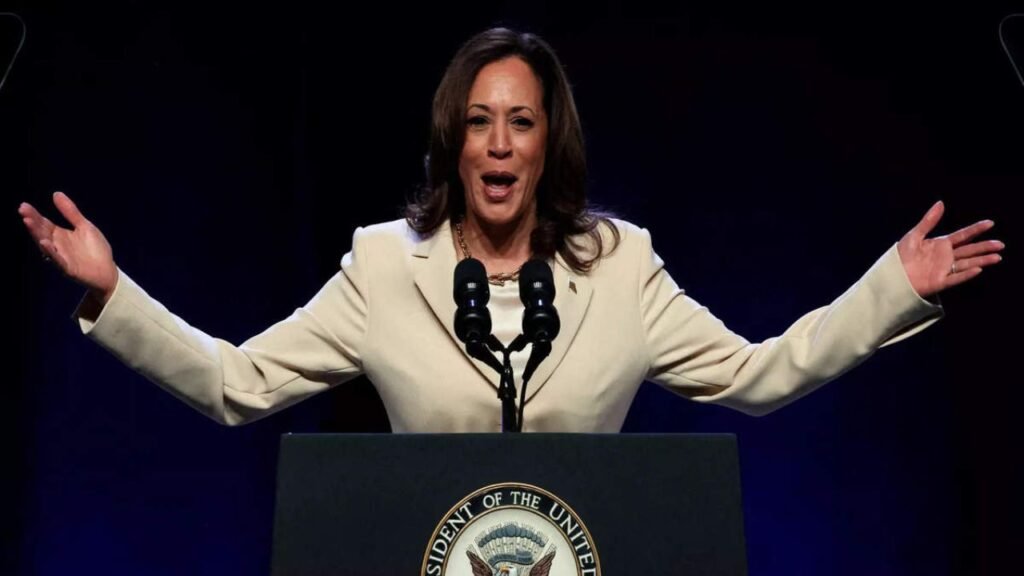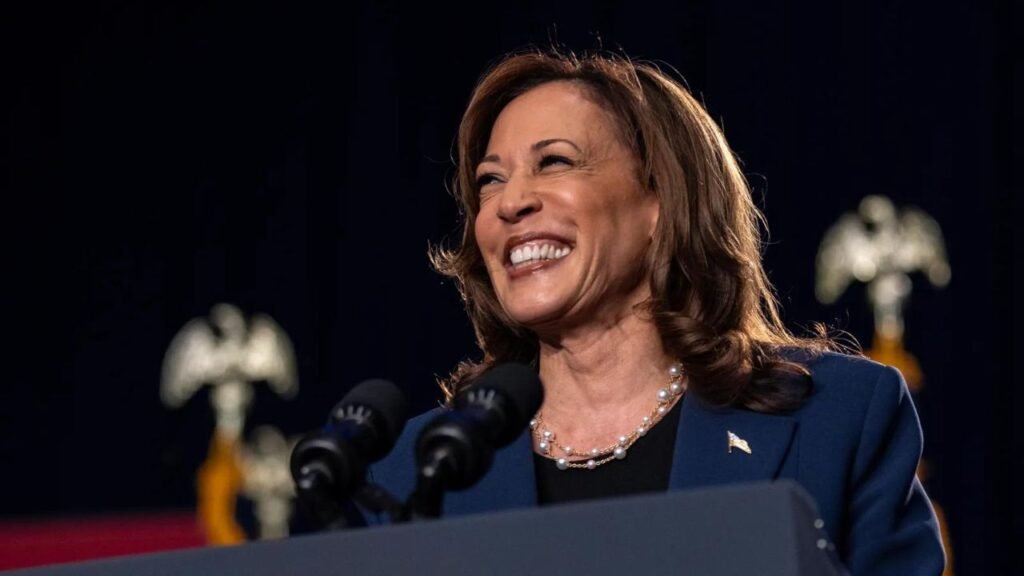Does Kamala Harris Support Fracking? Kamala Harris has expressed opposition to fracking in the past, advocating for a ban on it.
Kamala Harris, the current Vice President of the United States, is a figure known for her progressive policies, especially concerning climate change and environmental justice.
Her stance on various issues, particularly those related to the environment, often draws attention. One of the most contentious topics she has addressed is fracking—a method used to extract natural gas and oil from the earth.
The debate over fracking has become a focal point in discussions about America’s future energy policy, environmental health, and economic stability.
This blog post delves into Kamala Harris’s evolving position on fracking, her historical stance, current viewpoint, and the implications of her position for the future of energy in the United States.
Contents
- 1 What Is Fracking?
- 2 Kamala Harris’s Stance on Fracking: A Historical Perspective
- 3 Kamala Harris’s Stance on Fracking: Vice Presidential Role
- 4 5 Key Facts About Kamala Harris’s Support for Regulated Fracking
- 5 Environmental and Economic Strategies of the Biden-Harris Administration
- 6 Final Verdict
- 7 FAQs
- 8 Conclusion: Does Kamala Harris Support Fracking?
What Is Fracking?
Definition of Fracking
Fracking, or hydraulic fracturing, is a process used to extract oil and natural gas from deep within the earth. [Does Kamala Harris Support Fracking?]
The technique involves injecting a high-pressure mixture of water, sand, and chemicals into rock formations, creating fractures through which oil and gas can flow more freely.
While fracking has been instrumental in making the United States one of the largest producers of natural gas in the world, it has also sparked significant controversy.
Impact of Fracking
Fracking has a dual-edged impact: on one side, it has generated economic growth by creating jobs and making energy more affordable and accessible.
On the other side, it has raised environmental and health concerns, including groundwater contamination, increased seismic activity, and methane emissions.
Methane, a potent greenhouse gas, contributes to climate change, which makes fracking a significant environmental issue. The controversy lies in balancing these economic benefits against potential environmental hazards.
Critics argue that fracking poses too high a risk to the environment and public health to continue unchecked, while supporters believe it is essential for energy independence and economic stability.
Kamala Harris’s Stance on Fracking: A Historical Perspective
Early Opposition
During her time as a U.S. Senator from California, Kamala Harris was an outspoken critic of fracking. [Does Kamala Harris Support Fracking?]
She was a strong advocate for environmental protection and sustainable energy solutions, positioning herself as a progressive voice within the Democratic Party.
Harris supported a Green New Deal-like approach and repeatedly called for reducing the country’s reliance on fossil fuels. During her 2019 presidential campaign, Harris took a bold stance by advocating for a nationwide ban on fracking.
She argued that the environmental risks associated with fracking outweighed its economic benefits, aligning her with more progressive Democrats who pushed for aggressive climate action.
Harris’s call for a ban was well-received among environmental groups and young voters who were increasingly concerned about climate change and sought robust governmental action. [Does Kamala Harris Support Fracking?]
Her stance was seen as part of a broader commitment to transitioning the United States toward renewable energy sources like wind and solar power, aiming for a future less dependent on fossil fuels.
The Green New Deal and Harris’s Advocacy
Harris’s early opposition to fracking was part of a broader agenda aligned with the Green New Deal framework, which advocated for radical changes to address climate change.
She co-sponsored the Green New Deal resolution in the Senate, further cementing her position as a climate-focused politician.
This resolution aimed for a 10-year mobilization to achieve net-zero greenhouse gas emissions, focusing on sustainable agriculture, clean energy, and creating high-paying jobs in new, green sectors.
Harris’s advocacy against fracking was a reflection of this vision—an America that shifts rapidly away from fossil fuels.

Kamala Harris’s Stance on Fracking: Vice Presidential Role
Shift in Position
However, Kamala Harris’s stance on fracking began to shift as she transitioned from a presidential candidate to the Vice Presidential nominee on Joe Biden’s ticket in 2020.
While her earlier position was firmly against fracking, her stance softened to align with Biden’s more moderate approach.
During the campaign, she stated that there would be no ban on fracking under a Biden-Harris administration. [Does Kamala Harris Support Fracking?]
This adjustment was crucial to appeal to a broader electorate, particularly in swing states like Pennsylvania and Ohio, where the fracking industry provides significant economic benefits and jobs.
This shift from outright opposition to a more regulated approach reflects the complexities of national energy policies.
It also illustrates Harris’s pragmatic approach to governance—willing to compromise to achieve broader climate and energy policy goals. [Does Kamala Harris Support Fracking?]
While some environmentalists felt betrayed by this shift, others recognized it as a necessary step in pursuing incremental, realistic climate policy changes that could garner bipartisan support.
Policy Implications
The Biden-Harris administration’s policy on fracking represents a balance between environmental protection and economic pragmatism.
Rather than an outright ban, their policy emphasizes the need to regulate fracking more strictly, reducing its environmental impact while allowing it to continue where it is already established.
This approach includes setting stricter methane emission standards, improving well safety, and investing heavily in renewable energy alternatives.
The administration’s stance recognizes that an immediate end to fracking could have significant economic repercussions, especially in states dependent on the fossil fuel industry.
Economic and Environmental Realities
Kamala Harris’s shift in stance also underscores the importance of navigating between environmental advocacy and economic realities. [Does Kamala Harris Support Fracking?]
The U.S. energy industry is a massive economic driver, and an abrupt transition away from fossil fuels could lead to job losses and economic instability in key states.
Thus, her current stance allows for a more measured approach that balances the urgent need for climate action with practical economic considerations.
5 Key Facts About Kamala Harris’s Support for Regulated Fracking
- Balancing Climate Concerns with Energy Needs
Harris’s current position is about finding a balance between tackling climate change and ensuring a steady energy supply. She acknowledges the environmental risks posed by fracking but also understands the immediate need for energy and jobs that the sector provides, especially in economically crucial regions. - Biden-Harris Administration’s Energy Policies
The administration’s energy policy promotes a phased transition to renewable energy. Instead of an immediate fracking ban, they advocate for more regulations and a gradual move toward cleaner energy sources, such as solar and wind, as well as investments in clean energy infrastructure and technology. [Does Kamala Harris Support Fracking?] - Public and Political Reactions
The shift from a proposed ban to a regulated approach has sparked mixed reactions. Environmental groups and climate activists were disappointed by the apparent compromise. However, centrists and those dependent on the fossil fuel industry viewed this as a practical stance that still moves toward reducing carbon emissions without causing economic disruption. - Future of Fracking under Harris’s Influence
As Vice President, Harris will continue to advocate for tighter regulations on fracking and a focus on renewable energy. Her influence is expected to shape a future where fracking is more controlled and its environmental impact minimized, in tandem with expanding green energy initiatives. - Comparison with Other Democratic Leaders
Compared to other Democratic leaders, Harris’s current stance is more moderate. While some, like Bernie Sanders, have called for an outright ban on fracking, Harris aligns more with a centrist approach that emphasizes regulatory oversight and gradual policy shifts.

Environmental and Economic Strategies of the Biden-Harris Administration
Regulatory Measures on Fracking
Under the Biden-Harris administration, several measures have been proposed to regulate fracking more stringently. These measures include:
- Stricter Methane Regulations: Methane is a powerful greenhouse gas, and reducing methane emissions from fracking operations is a priority. The Environmental Protection Agency (EPA) under the Biden-Harris administration has moved to reinstate and expand methane regulations rolled back by the previous administration.
- Water Safety Standards: Ensuring the safety of drinking water sources near fracking sites has become a critical focus. This involves stricter monitoring of groundwater contamination and the management of wastewater produced by fracking.
- Research and Innovation Investments: The administration has pledged to invest in research to develop safer and cleaner fracking technologies, aiming to reduce the environmental footprint of current practices.
Economic Initiatives for Clean Energy Transition
Harris has been a strong advocate for transitioning to a clean energy economy. [Does Kamala Harris Support Fracking?]
As part of the administration’s broader economic and environmental policy, significant investments are being directed toward renewable energy projects and infrastructure development. This includes:
- Job Creation in Renewable Energy: Transitioning to renewable energy is positioned as a job creator, with plans to create millions of high-paying jobs in clean energy sectors.
- Subsidies and Incentives for Green Energy: Providing subsidies for wind, solar, and other renewable energy projects is aimed at accelerating the shift away from fossil fuels. This also includes tax incentives for companies and households that invest in clean energy solutions.
- Community Support Programs: The administration also focuses on supporting communities and workers dependent on fossil fuel industries, helping them transition to new employment opportunities in the renewable energy sector.
Final Verdict
Kamala Harris’s stance on fracking has undergone significant evolution—from a firm call for a ban to a more measured, regulated approach. [Does Kamala Harris Support Fracking?]
This change reflects both the complexities of U.S. energy policy and the broader strategic goals of the Biden-Harris administration to transition to a sustainable future without causing undue economic harm.
While her current stance may not fully satisfy all environmental advocates, it represents a pragmatic balance between climate action and economic stability.
See Also: Does AOC Support Kamala Harris? Support or Silence?
FAQs
Has Kamala Harris always supported fracking?
No, Kamala Harris initially opposed fracking and even advocated for a nationwide ban during her 2019 presidential campaign. Her position shifted to support regulated fracking under the Biden-Harris administration.
Why did Kamala Harris change her stance on fracking?
Harris modified her stance during her Vice Presidential campaign to align with Joe Biden’s more moderate approach, balancing environmental protection with economic needs in key swing states that rely on fracking jobs.
What is the Biden-Harris administration’s overall stance on fracking?
The administration supports regulated fracking with stricter environmental standards, while simultaneously investing in renewable energy and aiming for a gradual transition away from fossil fuels.
How does fracking impact the environment?
Fracking poses several environmental risks, including groundwater contamination, seismic activity, and methane emissions. These concerns have led to calls for more stringent regulations and, in some cases, bans.
Is fracking banned in any U.S. states?
Yes, some states like New York and Vermont have banned fracking, while others like California and Colorado have implemented strict regulations to mitigate its environmental impact.
Conclusion: Does Kamala Harris Support Fracking?
Kamala Harris’s stance on fracking embodies the challenges of navigating U.S. energy policy in the context of climate change. [Does Kamala Harris Support Fracking?]
From her initial call for a ban to her current support for regulated fracking, Harris’s journey reflects the complexities of governance where idealism often meets realism.
As the debate over fracking continues, the Biden-Harris administration’s approach seeks to balance the urgency of climate action with the practicalities of economic and energy security—a tightrope that will define the future of American energy policy.

Hi, I am Jackson Barton, a blogger who loves to share the latest news about the world. I cover big topics like the Israel-Palestine issue and news about Biden and Trump. Many people, like me, want to know whom famous people and brands support on these issues. That’s why I started my blog, to share important news and information with others who are also curious and eager to learn.

